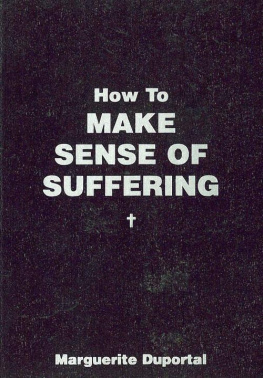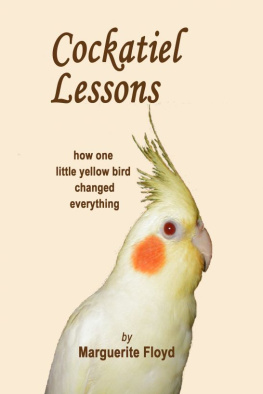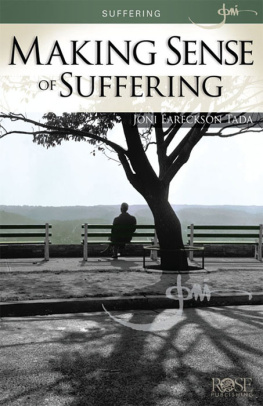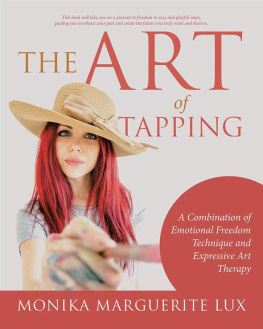Marguerite Duportal




....................... 3
....... 11
.......... 41
........ 55
............ 73
......... 85
Confronting myself with the obvious and unquestionable experience known as actual suffering, what invariably is my immediate reaction to it? Doubtless, it is a profound aversion. I dread the very thought of it. Even when impersonally considering the subject, should the menace of something painful suddenly obtrude itself, my first impulse would be to flee to avoid it, to resist its power.
Such is the instinct of my mind, the instinct of my whole being. But what will my afterthought, my second impulse, be?
Face-to-face with pain, my second thought is this: No matter what I may do, I cannot escape it. In fact, I see clearly that no one escapes it. Those who have flattered themselves most and boasted of their immunity, have at some time or other, perhaps frequently, come to realize rudely their illusion.
I know still further that here on earth, suffering is unequally distributed. But a secret and pitiless voice warns me that this inequality does not arise from man's cleverness or his awkwardness. Without doubt, there are evils that, according to the conduct of my life, I can either avoid or inevitably draw down upon my head. But there still remains that share of sorrow, unknown to me in kind and in degree, that I cannot evade. This share I must accept, making it my own without counting the cost, be it light or heavy. I have already felt something of it. I have suffered; I am suffering now; I shall suffer still more. This much is evident.
And what will be my second impulse? The first was to flee from suffering, to avoid it. I cannot do this, cannot carry it out. What, then, can be done?
Nothing else but to receive this undesired visitor, one to whom my door would never have been opened had he not entered unbidden. How shall I greet this guest whom I simply cannot welcome? What attitude shall I assume toward him? It is useless to close my eyes, to try to cast the intruder - this nuisance - out the window. I know it cannot be done. Better let me learn how to suffer, to suffer as well as possible and in the best way possible.
In fact, no other course remains. It is the one practical solution to the problem of suffering.
Note the facility with which words are used. "I bore my suffering well"; you constantly hear it said. But to suffer much is one thing; to suffer well is quite another. In suffering well, one suffers less than otherwise. There are a thousand ways of suffering at a disadvantage. How few persons, if they weighed their words properly, would have any right to say, "I have suffered well."
Your temperament affects how you bear suffering
Our suffering varies according to our character. The good or bad quality of our character influences the good or bad quality of our suffering. Our suffering corresponds to our temperament. Under the stress of pain, the apathetic become discouraged, the violent rebel, and the envious become morbid or evil-minded. The meek, the generous, the humble, and the zealous whose zeal is noble suffer "with a good heart." Suffering with a good heart brings the least bitterness into our pains, and is least productive of new sufferings.
Badly disposed characters undergo suffering in a way that intensifies ill-humor in themselves and inflicts the reactions of their trials upon others. Some scapegoat is necessary for them. By this we do not mean a victim to be tortured at will, but someone on whom to thrust the weight of the suffering endured. But does that lighten their burden? Not in the least! Pain cannot be transmitted like a package to anyone else. Those who try to spread it out only increase it. So a new suffering is created, and the infliction of it augments their own.
Even amid sufferings you must carry out your duties
Indeed, under all circumstances, a good temperament is a most valuable ally, helpful above all in times of misfortune. It lessens the keenness of the pangs of sorrow, sets limits to their depressing influence, extends and radiates the healing properties of affliction, and permits - as well as, if not better than, before - the fulfillment of what we call duty. For duty will never disappear from our lives.
When misfortune befalls us, whether as a visible catastrophe or as a tragedy that is locked up within our secret heart, draining its last drop of blood without anyone else suspecting it, we cannot afford to bury ourselves in our despair. We cannot afford to reject all participation in the ceaselessly pulsating life around us in order to permit our thought to concentrate on only one point, forgetting and disregarding everything else. Willy-nilly, the law of self-preservation quickly reasserts itself. Our responsibilities compel us to face moral and physical exigencies of every kind, to resume urgent occupations, and to meet persons toward whom we have assumed obligations. For certain natures, this compulsory resumption of exterior activities is a blessing, a fruit of suffering, a relief in the trial; for others, it is a new trial. For all, it is the beginning of a new life.
All these things must be done; we did them in a happy mood before the affliction came; we must do them now while suffering, even if we should feel ourselves unhappy. We cannot escape them. Hard hit though one may be, he retains his role, his mission, and his place in the economy of the universe; he remains himself; he remains a member of the human society, a creature of God. Therefore the issue is to know how to bear sorrow in the presence of God, in the presence of our fellow men, and within oneself.
Understand why God allows suffering
To suffer in the presence of God! Whether we have reflected on this or not, it remains a fact, solemn as the thought undoubtedly is. "It makes one tremble to write in the presence of the Blessed Trinity," says Ernest Psichari. Well may we tremble while considering that we are compelled to bear our heavy and blessed burden of sorrow in the presence of the Father who created us, of the Son who redeemed us, and of the Holy Spirit who showers His grace upon us.






















